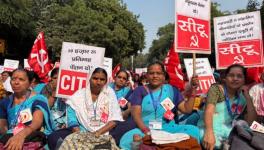Central Trade Unions Come Together to Save Bengal's Jute Industry
Kolkata: A decision was taken to forge a joint movement to save the ailing jute industry as representatives of all Central Trade Unions, including CITU, AITUC, INTUC, and BMS, met recently at Shramik Bhavan (CITU state headquarters) in Kolkata at a joint convention. They highlighted that due to illegal hoarding of raw jute by middlemen and without central or state interventions, the jute industry of Bengal is facing a deep crisis.
Jute is grown in vast areas of the state covering South and North Bengal. The state accounts for nearly 80% of the area under jute cultivation and 83% of its total production in the country. This year production of raw jute has increased. The Centre also raised the minimum support price of jute to Rs 4,500 a quintal (TD-5 variety) in 2021 from Rs 4,225 in 2020, which was expected to help the higher production. However, in the absence of an effective role played by the Jute Corporation of India (JCI), farmers say the price of raw jute earned by them is hardly ever equivalent to the MSP in the open market.
Moreover, the huge credit period and understanding among the jute mill owners while directly purchasing from farmers make the jute cultivators incapable of bargaining for better prices. However, this year, the middlemen have hoarded vast amounts of raw jute in their godowns and mills are closing down due to the want for the raw material, the trade union representatives claimed.
The jute mills now work on seasonal capacity, and unlike the earlier permanent arrangements, seasonal employment arrangement has been bolstered with the introduction of cheap and new high-capacity machines called China machines to reduce the worker's roles. According to the CTUs, there are more than 150 jute mills on both sides of river Hooghly in West Bengal, and most of these work on seasonal arrangements and call for layoffs at the slightest of issues. At the convention, the poor state of the jute industry was elaborately discussed by the representatives of the various trade unions.
They also alleged that the jute workers are amongst the lowest-paid workers in the eastern state, and a tendency has grown to make the jute workers toil at less than minimum wage. To ward off any union activity, the Trinamool Congress-led government has arranged police pickets outside the jute mills' gates. Within the mill premises, the authorities now rely on bouncers whom they employ to stop any union activities therein, the unions claimed. They further alleged that these bouncers often physically and mentally torment the jute mill workers.
A total of 21 trade unions working in the jute mill sector of the state met at Monday's convention. There, they decided that through a unified workers' movement, the mill owners would be forced to participate in a tripartite meeting to sign a new wage agreement. The state government's labour department, a party in the tripartite meet, only knows the language of movement, and through fostering of workers' movements, they would be forced to convene tripartite meetings, the unions said.
It was also decided that in all the districts, conventions and meetings before every jute mill gate will be held on a 27-point demand charter. On June 13, there will be a convention in Howrah, followed by one in North 24 Parganas on June 17 and Hoogly district on June 24.
Anadi Sahoo, general secretary of Bengal Chatkal Mazdoor Union (BCMU), at the start of the convention, placed the draft proposal saying that, at present times, the jute industry is facing a deep crisis.
Only due to supply constraints of raw jute, over 14 jute mills have closed down, leading to the unemployment of over 50,000 mill workers, Sahoo said. He noted that this year, raw jute production has been up to the mark. However, due to conspiracy by a section of jute barons and mill owners, the industry is facing a shortage of raw materials, he alleged.
The present situation has hit the common workers of the jute industry hard and hunger is now a perennial thing in their homes, the BCMU leader said. He added that while the permanent jute mill workers are being forced to work at Rs 370 per day, all trade unions have demanded to raise the daily wage of an average jute worker to Rs 1000.
Besides, in many jute mills, the owners have looted the retirement dues of the mill workers, Sahoo claimed. In this background, the 27-point demand charter has been drafted.
In the convention, the leaders also accused the ruling party of West Bengal of maintaining backdoor diplomacy with the erring jute mill owners, resulting in losses for the workers. To tackle this, the central trade unions have called for forging a movement on the lines of the farmers' movement in New Delhi, which has shown them the importance of a unified movement.
The unions also noted that many mill contractual workers are now employed without any social security net and are paid only Rs 500 per day. In the jute mills, the authorities now employ women daily wagers by paying them even less than the permanent workers. The women jute mill workers do not have toilets within the mill premises and are exploited to the core, they said. They added that the industry is suffering due to a low-wage structure, and permanent and skilled workers are leaving the arena for greener pastures or returning to their villages in the North Indian states.
After the TMC government was sworn to office, the exploitation of the jute workers increased manifolds as they faced severe exploitation but were unable to convene any strike due to a government ban, the unions said.
In 2019, a wage agreement was signed, but that is yet to be made functional at the mill level across the state, the union leaders said. During the Covid-19 period, the workers didn't get any wages even though the government assured them their salaries. The Mamata Banerjee government chose not to go to the Supreme Court to challenge the decision of the jute mill owners for not giving any relief to the mill workers.
The convention on Monday was administered by a praesidium comprising trade union leaders such as Dipak Dasgupta Ganesh Sarkar, Debasish Dutta, Atanu Chakraborty, and Amal Sen, among others. Many affected jute mill workers also spoke at the convention and highlighted their exploitation.
Get the latest reports & analysis with people's perspective on Protests, movements & deep analytical videos, discussions of the current affairs in your Telegram app. Subscribe to NewsClick's Telegram channel & get Real-Time updates on stories, as they get published on our website.






















